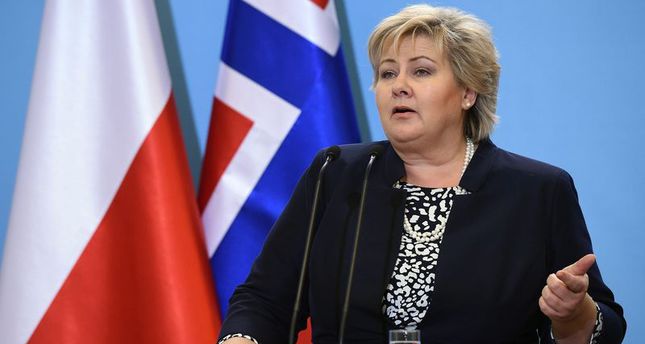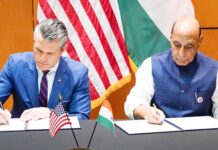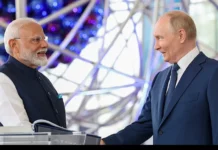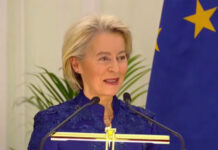GHAZIABAD (UP): Norwegian Prime Minister Erna Solberg Monday lauded her Indian counterpart Narendra Modi’s “everyday, normal life politics” that dealt with direct problems of the people as she cited the example of Swachh Bharat Abhiyaan.
She said the campaign might seem “not-so-visionary, not up in the skies” but it is needed to solve the sustainable development challenges because sanitation is an extremely important issue.
Solberg also said India and Norway can collaborate on innovation in the field of education by utilising technology, especially in rural areas.
The prime minister Monday visited a government primary and middle school in Nithora village of Ghaziabad’s Loni area where she met with children, teachers and locals to interact on issues such as sanitation and female literacy.
The Scandinavian leader, who is on a three-day visit to India, stressed that girls’ education is the most important development rule not just for girls’ rights but for any country’s development.
“No country can only use half of its potential, half of its talent,” she said, noting that it was “unfair” that girls have so far been “deprived” of same education opportunities as boys due to various factors, including sanitation.
“The fact that girls have toilets and sanitary facilities makes it much easier when you are on period, which is one of the biggest obstacles for girls to continue education. We know from different countries of the world that girls often leave school at the age of 10, 11 or 12 because their parents withhold them for domestic duties and also because they feel unclean, and there is no sanitary system that could make it possible,” she told reporters.
Asked for her views on PM Modi-initiated Swachh Bharat Abhiyaan, she said, “I think that’s a man doing everyday, normal life politics. That is great, because as we see here, sanitation is getting girls to go to school. So I think it’s great and addressing the direct problems.”
“It might seem not-so-visionary, not up in the skies but it’s everyday politics and we need that to solve this sustainable development challenges because sanitation is an extremely important part,” she added.
The two-time Norwegian prime minister said she was also touched when she heard one of the parents say that they were happy with two girls and did not feel the need for a boy as she referred to the “traditional” Indian desire for male child.
“When the view is changing like that it means the value of women and girls is increasing in India and also in local communities. That is great,” Solberg said.
She said violence against women is a global problem.
“It is a universal challenge we all have to continue to work on and it is also very important that we have a police and criminal court system that also looks at domestic violence, rape and other issues like that. But I think education is the key to that, and I’m impressed by the children here who really are part of transforming (the situation),” she said.
To a question on reservation as a means to promote gender equality in institutions, she said, “I think representation is important and not to just pass laws.”
She added that with an increase in women’s participation in her country’s politics, the politicians became more concerned and connected to everyday life.
Asked about areas where India and Norway can collaborate, she said innovation in the field of education like utilising information and communications technology (ICT) could be one.
“I think we can work on innovation, on new ways of doing things on educational innovation. With so many people living in India, we can use ICT more in education systems in rural areas. Norway is a very scarcely populated country where people live far from each other. So we also had to develop that but we are much fewer than India,” she said.
Solberg, who arrive in Delhi on Monday, will hold talks with Prime Minister Narendra Modi on a host of issues with an aim to expand the multi-faceted bilateral partnership.
She will deliver the inaugural address at the Raisina Dialogue and address India-Norway Business Summit during her visit.
She will also call on President Ram Nath Kovind and Vice President M Venkaiah Naidu. PTI







